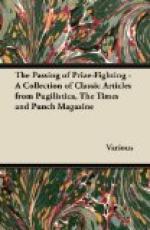At the meeting of the Musical Reconstruction Commission last Saturday the President, Mr. Justice Bland, announced the resignation of Mr. Patrick Horan, an Irish choirmaster, owing to the results of his adjudicating between the competing Sinn Fein brass bands at a “Feis,” or festival, held at Athlone on Easter Monday. Mr. Justice Bland said that he felt sure he was interpreting the feelings of all the members of the Commission in uniting to express regret at Mr. Horan’s resignation and hope for his speedy recovery from his injuries. Continuing, the President said he had received a letter from the Minister of Music, informing him that Sir Hercules Plunkett, K.B.E., Chairman of the Amalgamated Society of Mandolin, Balalaika and Banjo-makers, had been invited to fill the vacant place.
Mr. Tony Hole, Scriabin Fellow of Syndicalist Economics at Caius College, Cambridge, then presented a memorandum on the Guild Control of Composers on the bagis of a forty-hour week, with equal opportunity for performance, the economic use of orchestral resources and the preferential treatment of Russian folk-tunes as thematic material. All members of the Guild should receive the same salary free of income tax; all performances should be free, and applause or encores prohibited as likely to lead to the rupture of artistic solidarity. The profits from the sale of programmes should go into the National Exchequer, but should be earmarked for a Pension Fund for the relief of composers on their compulsory retirement at the age of sixty.
Examined by Sir Leonardo Spaghetti Coyne, Mr. Hole said that he was not aware that the mortality among monkeys employed in the piano-organ industry during the late War was excessive. But he agreed that the fearlessness shown by the monkeys at the Zoo in the course of air-raids deserved a special decoration.
Mr. William Susie, who next occupied the chair, was examined by Mr. Moody MacTear on the question of the nationalisation of Royalty Ballads.
Mr. MacTear, quoting an estimate by a Fellow of the Thermaero-statistical Society, that the ballad composers of the country could produce one hundred and ninety thousand million ballads in five hundred and eighty years, asked the witness whether it would be legitimate that a royalty charge should be made on every ballad produced during that period for the benefit of certain individuals of future generations. Mr. Susie replied that the State had recognised the right of royalties and therefore he saw no good reason for discontinuing the charge.
Mr. Gladney Jebb. Are you aware that there have been more cases of influenza amongst people who have attended Royalty Ballad concerts in 1918 than amongst all the troops who served on the Palestine Front since 1916? Mr. Susie challenged Mr. Jebb to produce his statistics, and it was arranged, at the suggestion of the President, that Mr. Jebb should be given facilities to proceed to Jericho and collect them.




